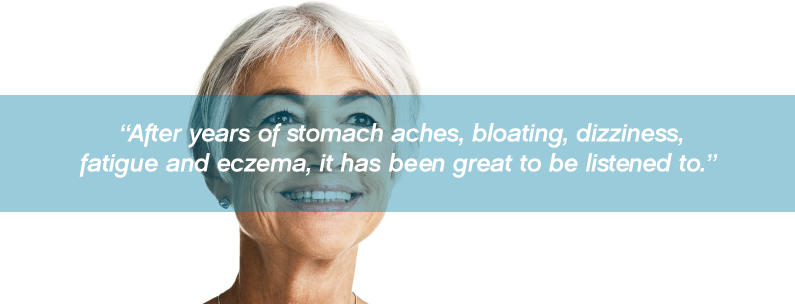Patient, woman 34, with myalgic encephalomyelitis and chronic fatigue syndrome.
Patient, woman 34, with myalgic encephalomyelitis and chronic fatigue syndrome.
Our patient suffered from myalgic encephalomyelitis (ME / chronic fatigue syndrome) after an infection in the fall of 2013. She continued as usual with work and exercise. After each workout, she got a sore throat. Later, her legs felt weak with very light exertion. Our patient had very little physical and mental strength, and her health and well-being deteriorated rapidly. She experienced an elevated heart rate, palpitations, frequent infections with fever that were very stressful. She had made some diet changes and started with acupuncture. In 2016, the patient started his journey at Nordic Clinic by filling out a comprehensive questionnaire and a food diary.
Functional tests used:
Test for bacterial growth in the small intestine
Organic acids
Tarmflora test
DNA analysis
Functional tests – results:
Tests for bacterial growth in the small intestine showed high growth.
Organic acids showed some weaknesses in biochemical processes such as mitochondrial energy production.
Intestinal flora test showed some overgrowth of yeast fungus in the intestinal flora and lack of short-chain fatty acids.
DNA analysis revealed, among other things, single nucleotide polymorphisms (SNPs / abnormalities) in genes responsible for biotransformation, detoxification and endogenous antioxidant production, an increased risk of inflammation via IL-6 and decreased vitamin D signaling.
Suggestions for treatment:
Elimination of bacterial overgrowth: Diet that excluded fermentable oligosaccharides, disaccharides, monosaccharides and polyols (FODMAPs) as well as antimicrobial agents for the treatment of overgrowth and antiviral treatment (reduces virus replication).
Optimization of mitochondrial energy production: targeted nutrition therapy with specific nutrients to support biochemical processes.
Supporting the integrity and function of the intestinal mucosa / promoting a healthy and rich intestinal flora: Probiotics / Butyrate /.
Dietary supplements to promote a good environment in the intestinal mucosa.
Correction of identified nutritional deficiencies.
Targeted supplements in support of processes identified by DNA analysis.
Suggested lifestyle interventions:
Eating a large variety of foods contribute to the microbial richness in the intestinal flora.
Slowly increase physical activity.
Meditation.
Exposure to sunlight early in the morning.
Exercises to activate the vagus nerve.
Results and follow-up:
After treatment, the patient was tested again for bacterial growth in the small intestine, the test result was negative.
The patient started exercising in 2017, and today she can work 75%, and she feels “much, much better”.
The patient has better digestion, rebuilds faster and managed to integrate more activities.
The need for sleep has decreased significantly.




